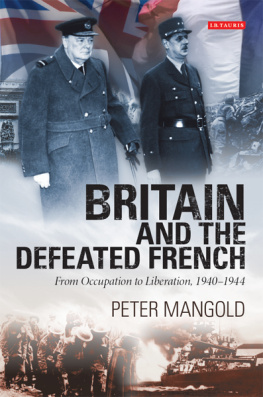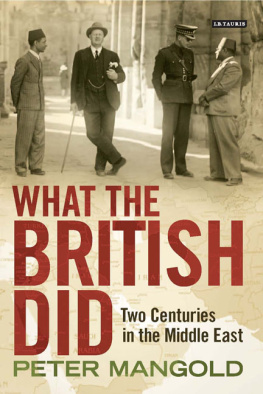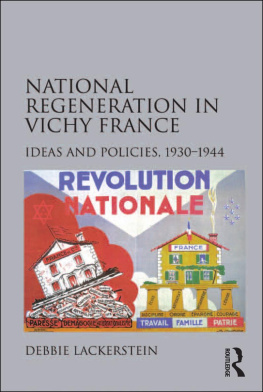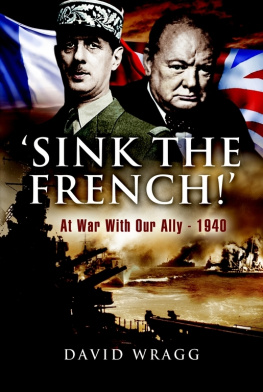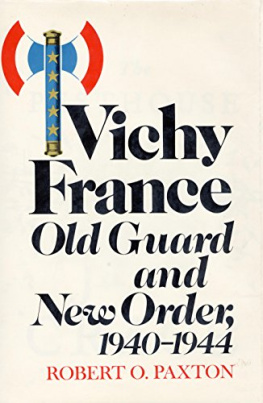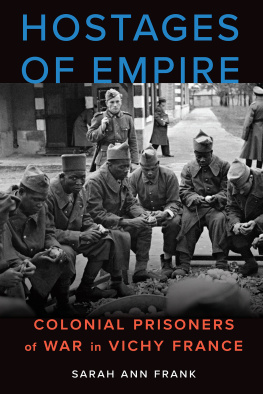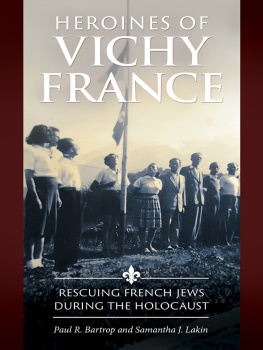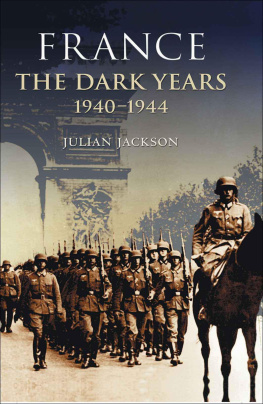Peter Mangold is an author and a Senior Associate Member of St Antonys College, Oxford. He is a former member of the Foreign and Commonwealth Office Research Department and the BBC World Service. He is the author of The Almost Impossible Ally: Harold Macmillan and Charles de Gaulle (I.B.Tauris, 2006).
It is a concise, clearly written, lively and well-focused account of the wartime relationship, drawing on a wide range of sources. There is a lot in this book, and the authors judgements are crisp and well informed.
Robert Tombs, Professor of History, St Johns College, Cambridge
Mangold tells this story with understanding and verve.
Hilary Footitt, Senior Research Fellow, Department of Modern Languages and European Studies, University of Reading

Published in 2012 by I.B.Tauris & Co Ltd
6 Salem Road, London W2 4BU
175 Fifth Avenue, New York NY 10010
www.ibtauris.com
Distributed in the United States and Canada Exclusively by Palgrave Macmillan 175 Fifth Avenue, New York NY 10010
Copyright 2012 Peter Mangold
The right of Peter Mangold to be identified as the author of this work has been asserted by him in accordance with the Copyright, Designs and Patent Act 1988.
All rights reserved. Except for brief quotations in a review, this book, or any part thereof, may not be reproduced, stored in or introduced into a retrieval system, or transmitted, in any form or by any means, electronic, mechanical, photocopying, recording or otherwise, without the prior written permission of the publisher.
ISBN: 978 1 84885 431 4
eISBN: 978 0 85773 330 6
A full CIP record for this book is available from the British Library
A full CIP record is available from the Library of Congress
To John Eidinow, friend and criticBe patient if you find a Frenchman hard to understand he is having difficulties too. ( Instructions for British Servicemen in France )
Contents
Introductory
Rival, Enemy, Ally, Friend
Part I
Hitlers Diktat
Part II
Somewhat Difficult People
Plates
Abbreviations
AFHQ: Allied Forces Headquarters (Algiers)
AMGOT: Allied Military Government of Occupied Territories
BBC: British Broadcasting Corporation
BCRA: Bureau Central de Renseignement et dAction
BEF: British Expeditionary Force
CNR: Conseil National de la Rsistance
FCNL: French Committee of National Liberation
FFI: French Forces of the Interior
FNC: French National Committee
FO: Foreign Office
FTP: Francs Tireurs et Partisans (Communist-led Resistance group)
GPRF: Gouvernement Provisoire de la Rpublique Franaise
PWE: Political Warfare Executive
RAF: Royal Air Force
SHAEF: Supreme Headquarters, Allied Expeditionary Force
SIGINT: Signals Intelligence
SIS: Secret Intelligence Service (MI6)
SOE: Special Operations Executive
STO: Service du Travail Obligatoire (originally know as la Relve)
USAAF: United States Army Air Force
WAC: BBC Written Archive Centre, Caversham
Operations
Attila: Codename for German occupation of whole of France, November 1942
Barbarossa: German invasion of the Soviet Union, June 1941
Catapult: Operation against French fleet, July 1940
Crusader: Attempt to relieve Tobruk, November 1941
Dragoon: Landings southern France, 15 August 1944 (previously Anvil)
Exporter: Levant operation, 7 June 1941
Husky: Sicily landings, July 1943
Ironclad: Madagascar, 5 May 1942
Menace: Dakar, September 1940
Overlord: D-Day landings, 6 June 1944
Roundup: Proposed landings in France, 1942
Sealion: German invasion of Britain 1940
Sichelschnitt: German invasion of France, 1940
Sledgehammer: Proposed small-scale attack on the Cotentin Peninsula, 1942 or 1943
Streamline: Jane Occupation of whole of Madagascar, autumn 1942
Supergymnast: Proposed attack on Morocco and Algeria (later Torch)
Susan: Proposed operation in Morocco, June 1940
Torch: North African landings, 8 November 1942
Acknowledgements
My thanks to Clare Brown, John Eidinow, Lucian Randall, Tom Purton and John Tod for help with this project.
I am also grateful to Virginia Makins for permission to quote from the Sherfield Papers in the Bodleian Library, Oxford; to Jane Reilly for permission to quote from the Reilly Papers, also in the Bodleian; and to the BBC for permission to quote from material in the BBC Written Archives Centre in Caversham.
Introductory
Rival, Enemy, Ally, Friend
LEntente Est Morte.
Vive LEntente!
On 14 June 1940, Violet Bonham-Carter, daughter of the Liberal Prime Minister, Herbert Asquith, and a close friend of Winston Churchill, visited her son at Winchester. It was, she recorded in her diary,
a radiant day. The buildings rose in silvery beauty from amongst the trees The stream along the edge of Meads flowed crystal clear. Boys passed through War Memorial raising their straw hats as they went. Very old dons crawled about in the sunshine. All unchanged and seemingly unaware. We lunched at school-shop on buttered eggs and strawberries. The young waitress bringing in the strawberries suddenly said to us with a bright uncomprehending smile on her face The Germans have entered Paris.
Across the Channel, a remarkable military campaign was reaching its climax. Five weeks earlier, in the early hours of 10 May, Germany had attacked the Low Countries. On the 13th, German armoured forces spearheaded by General Erwin Rommel had surprised the French at Sedan and crossed the Meuse. From here they advanced at such speed that they had not bothered to take prisoners, simply telling captured French troops to throw away their arms and head south so as not to clutter up the roads. By 20 May, German forces had reached the Channel coast, surrounding the Allied armies in Belgium and forcing the evacuation of the British Expeditionary Force (BEF), minus its equipment, at Dunkirk.
The next German offensive, launched on 5 June, had been south-west towards Paris. The French government, headed by the Anglophile Paul Reynaud, retreated first to Tours on the Loire, and then to Bordeaux. It was here that on the evening of 16 June Reynaud resigned, to be succeeded by the octogenarian First World War hero Marshal Philippe Ptain. The new government wasted no time in suing for an armistice. The night before it came into effect, a strange scene was played out in the peasant house where Hitler was staying near Sedan. The German leader ordered the lights to be turned out. Silently, his architect Albert Speer recorded,
we sat in the darkness, swept by the sense of experiencing a historic moment so close to the author of it. Outside, a bugler blew the traditional signal for the end of fighting. A thunderstorm must have been brewing in the distance, for as in a bad novel occasional flashes of heat lightning shimmered through the dark room. Someone, overcome by emotion, blew his nose. Then Hitlers voice sounded, soft and unemphatic: This responsibility

